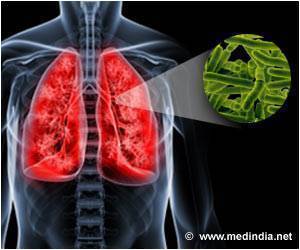Extensively drug-resistant tuberculosis (XDR-TB) is increasingly common and deadlier than previously thought.
A new study has revealed that extensively drug-resistant tuberculosis (XDR-TB) is increasingly common and deadlier than previously thought.
The study compared patients with XDR-TB to individuals with other types of multi-drug-resistant TB (MDR-TB), and showed that those with the former condition were four times as likely to fail treatment and three times more likely to die.Published in the American Journal of Respiratory and Critical Care Medicine, the study also found that MDR-TB was "a major threat to public health," representing 2.7 percent of new TB cases in South Korea in 2004, up from 1.6 percent in 1994.
"Treatment outcomes (of XDR-TB)have varied among studies, and data on long-term survival are still scarce," wrote Dr. Tae Sun Shim, an associate professor at Asan Medical Center in Seoul, South Korea, and a principal investigator of the study.
"(This) is the largest report that we know of that compares patients with XDR-TB with other patients with MDR-TB to determine the impact of XDR-TB on treatment outcomes and long-term survival in mostly HIV-negative patients with MDR-TB," Dr. Shim wrote.
The researchers reviewed the medical records of more than 1,400 patients in South Korea with MDR-TB (which includes XDR-TB) from all national hospitals, Korean National TB Association chest clinics and select university hospitals. The patients' history of TB and previous treatments were also noted.
In this study, XDR-TB was defined as MDR-TB resistant to both ofloxacin and at least one second-line injectable drug.
Advertisement
They said that treatment failure among that population was much more common when compared to other patients with MDR-TB.
Advertisement
"(Having) XDR-TB was the strongest predictor of both all-cause and TB-related mortality, and survival curves showed higher cumulative mortality among patients with XDR-TB than in other patients with MDR-TB," wrote Dr. Shim.
The researchers said that only through further research and concerted effort to understand and quantify the effects of the disease could really prevent MDR- and XDR-TB from becoming pandemic health crises.
"As we wait for new diagnostics and drugs that can meet the challenge of XDR-TB, we must work with what we presently have to create the optimal conditions for success and thus seize the opportunity we have to eliminate tuberculosis," they concluded.
Source-ANI
SPH













